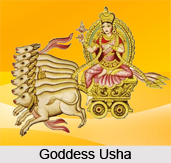 The Goddess of Dawn is an important and favourite Vedic Deity. It is the goddess who stirs all creatures and makes them move in this world. The goddess is borne on a chariot. She not only dispels darkness and brings light to mankind but at the same time she brings happiness, hope and all other good things to mankind. She is the goddess of light and beauty and was invoked by the Risis of early age for their protection.
The Goddess of Dawn is an important and favourite Vedic Deity. It is the goddess who stirs all creatures and makes them move in this world. The goddess is borne on a chariot. She not only dispels darkness and brings light to mankind but at the same time she brings happiness, hope and all other good things to mankind. She is the goddess of light and beauty and was invoked by the Risis of early age for their protection.
Usha has been described in the Rig Veda as the first self-effulgent white-complexioned though sprung from darkness; as the Mother of the Gods and of the Sun, "Immortal" and "Undecaying" ; as possessing perpetual youth "whiterobed"; Doer of good, bright-coloured, "the daughter of Night" and "the leader of the gods, advancing like a warrior armed with bright weapons" ; as "the wife of the Sun" and "the daughter of Agni" or Prajapati, as explained by Yaska ; as ``dark-complexioned at first, and white-complexioned afterwards," "the leader of all living creatures" and "the sister of Night"; as "the daughter of heaven"; as "the ancient"; as "deserving the homage of all and as "the ancient youthful damsel"; as "the destroyer of darkness"; as "golden-coloured"; as "the lord of all"; and as "the one who issued forth after breaking the strong gates or barriers of the Mountain".
In Usha of Rig Veda all the attributes of the Pauranic Durga or Uma are found. She is represented as Navayauvanasampanna (possessing perpetual youth): Sarvabharanabhushita (decked in gold); Puratani (ancient); Hiraumayi (golden-complexioned); Shiva (doer of good); Kali (dark-complexioned); Asuranasini (destroyer of the powers of darkness); Vividhayudhadharini (like a warrior armed with bright weapons): Davamata (mother of the Gods); Dakshakanya (the daughter of Prajapati) Giribala (issuing forth after breaking the strong barriers of the mountain) and so forth.
Goddess Usha is among the few goddesses which have been mentioned in the Rig Veda. The goddess symbolises giving up of all negative energies and taking all positive vibes into the life.




















